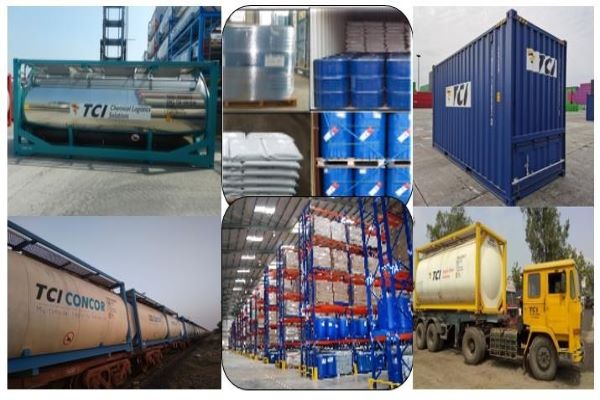There’s a lot to be done for the chemical logistics industry to be at par with the growth story of India’s chemical industry

Over the course of last three years, supply chains across have gone through a paradigm shift. From automobiles, consumer goods, B2C/D2C, all have adopted a ‘PHYGITAL’ approach of functioning. When it comes to the evolution of chemical industry in India, the numbers say it all. It has grown significantly, almost triple in size during the last decade & is expected to experience a compound annual growth rate (CAGR) of 12%-15% by 2025, with its estimated value reaching to a whopping USD 300 billion*. However, for chemical supply chain in India, wherein the ‘PHYSICAL’ aspect currently faces the challenge of lack of investment in logistics infrastructure and ownership of physical assets; ‘DIGITAL’ for tech-adoption and being ready for emergency response, the question of – ‘IS IT ACTUALLY READY TO CHANGE?’ still cannot be answered with full confidence. There’s a lot to be done for the chemical logistics industry to be at par with the growth story of India’s chemical industry and more importantly be counted amongst its peers.
As we know that chemical logistics is a specialized domain that requires expertise to effectively manage the risks associated with chemical handling, logistics and storage, so we, as the logistics fraternity need to answer some tough questions, like:
Yes, at TCI, we have been doing our bit to resolve these challenges and enable processes that help the chemical logistics industry make its mark, like D2C has. We are investing in assets, like ISO Tank Containers, that are game changers for safe and secure transportation of chemicals, both hazardous and non- hazardous. We promote multimodal movement as it is cost-effective & helps reduce the overall carbon footprint.

*Source: Department of Chemicals and Petrochemicals
To elaborate on benefits of ISO Tank Containers, these provide:
Enhanced safety: ISO Tank Containers are designed to safely transport hazardous chemicals, minimizing the risk of accidents and spillages during transportation. The containers are made of high-quality steel or aluminum, which provides strength and durability while preventing leaks and contamination.
Improved efficiency: ISO Tank Containers offer a more efficient method of transporting chemicals compared to traditional packaging such as drums or barrels. The containers can be easily loaded and unloaded from trucks, ships, and trains, reducing handling times and improving supply chain efficiency.
Reduced handling costs: ISO Tank Containers can be reused multiple times, reducing the need for packaging and associated handling costs. This helps to reduce transportation costs and lower the overall carbon footprint of the supply chain.
Increased security: ISO Tank Containers are sealed during transportation, minimizing the risk of theft or tampering. The containers can be easily tracked using advanced technologies such as GPS, providing real-time visibility of shipments.
Versatility: ISO Tank Containers can transport a wide range of hazardous and non- hazardous chemicals, making them a versatile and flexible transportation option for chemical companies. They can also be customized with features such as heating or cooling systems to meet specific transportation requirements. Most importantly the ISO Tank can go on a Truck, a Ship, and a Train!
When it comes to safe storage of chemicals, in addition to PESO (The Petroleum and Explosives Safety Organization) certified warehouses, the temperature-controlled warehouses are being built using the advanced technologies and are equipped with state-of-the-art refrigeration systems. These facilities maintain a constant temperature range, typically between 2°C to 8°C, to prevent degradation and ensure the safe storage and transportation of temperature-sensitive chemicals.
For responsible handling of chemicals, various initiatives like ‘Responsible Care’ by Indian Chemical Council are being adopted. By doing so, chemical logistics companies in India can demonstrate their commitment towards safety and security by training the LSPs, the entire ecosystem to be involved. Training remains and should be the topmost priority! Are chemical producers and users doing enough in this area, the answer is NO, time to reflect.
Other than this, hazardous waste management rules, Green Rating for Integrated Habitat Assessment (GRIHA), Sustainable Development Goals (SDGs) and Global Product Strategy (an initiative launched by the International Council of Chemical Associations (ICCA) to promote the safe use of chemicals) are fostering the creation of a safer & more sustainable chemical industry; to build trust and confidence amongst all stakeholders.
Through our sub-division, TCI Chemical Logistics Solutions, we handle nearly 1 million tons of liquids, solids, and gases annually. We manage an asset base of 650+ ISO T11 tank containers, dry bulk cargo steel containers and T20 Tank containers. We own fleet of 200+ vehicles for Chemical operations and have PESO compliant warehouses that meet modern fire safety infrastructure standards for safe storage of a wide range of hazardous & non-hazardous chemicals.
Adding to the critical areas of work, the ongoing transition to ESG (Environment, Social & Governance) norms/principles, not just for chemicals but for all other industries, will take time of about 5-7 years for on-ground implementation. As a part of this, proper training for all associated stakeholders involved in chemical logistics should be planned. This will also help on-ground executors to understand the importance of MSDS (Material Safety Data Sheet) & how it plays a critical role in avoiding mishaps/accidents.
We wish to make a clarion call, let’s all find a solution to this conundrum by investing in logistics assets, building quality infrastructure for chemicals handling, training the key actors i.e. drivers, blue collar workers & handlers on how to live with chemicals safely. Hence, making their lives better.
Subscribe to our newsletter & stay updated.